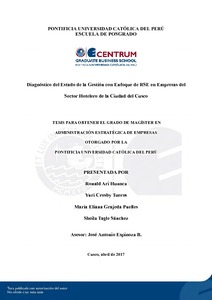| dc.contributor.advisor | Espinoza Ballena, José Antonio | |
| dc.contributor.author | Ari Huanca, Ronald | es_ES |
| dc.contributor.author | Crosby Tueros, Yuri | es_ES |
| dc.contributor.author | Grajeda Puelles, María Eliana | es_ES |
| dc.contributor.author | Tagle Sánchez, Sheila | es_ES |
| dc.date.accessioned | 2017-06-23T17:48:53Z | |
| dc.date.available | 2017-06-23T17:48:53Z | |
| dc.date.created | 2017 | |
| dc.date.issued | 2017-06-23 | |
| dc.identifier.uri | http://hdl.handle.net/20.500.12404/8886 | |
| dc.description.abstract | La responsabilidad social empresarial (RSE) se desarrolla en el Perú en diferentes rubros,
debido al valor que genera, a la mejora en la reputación y a las cualidades diferenciadoras que
permiten ventajas competitivas que aseguran la participación en el mercado. Esta
investigación analiza el estado de la gestión con enfoque de RSE en el rubro hotelero en la
ciudad del Cusco en cinco empresas. Su enfoque es cuantitativo y es de alcance descriptivo,
no experimental transeccional. Los resultados se obtuvieron mediante encuestas y entrevistas
de profundidad, utilizando las siete dimensiones de la RSE identificadas por Perú 2021 y el
Instituto Ethos de Responsabilidad Social: (a) valores, transparencia y gobierno corporativo,
(b) público interno, (c) ambiente, (d) proveedores, (e) consumidores y clientes, (f)
comunidad, y (g) gobierno y sociedad. Se encontró que para el empresario hotelero y para el
turista que llega a Cusco, la RSE está relacionada, principalmente, a buenas prácticas
ambientales, valores y buen gobierno corporativo, lo que puede constituir un criterio de
selección del servicio. Los resultados del estudio son los que siguen: (a) en la primera
dimensión, son altos (84%), por lo que se considera que se encuentran en la etapa 4; (b) en
relaciones con el público interno, el nivel de cumplimiento es medio y están en la etapa 3
(58%); (c) en la dimensión ambiental, es alto (80%) y están en la etapa 4; (d) en las
relaciones con sus proveedores, el avance es medio (55%) y están en la etapa 3; (e) en
relación con los consumidores y clientes, tienen un alto nivel de calificación (91%) y están en
la etapa 4; (f) en relación con la comunidad, el avance es medio (64%) y están en la etapa 3;
(g) en las relaciones con el Gobierno y la sociedad, es bajo (40%) y están en la etapa 2, que
implica una participación y apoyo limitados a proyectos gubernamentales de apoyo social | es_ES |
| dc.description.abstract | Abstract Corporate social responsibility (CSR) is developed in Peru in different lines of
business, due to the value it generates, to the image enhancement and to the differencing
qualities that allow competitive advantages and because it guarantees the market share. This
research analyzes the management status with a CSR focus of five hotel companies in the
City of Cusco. Its focus is quantitative and it has a descriptive scope, and it is not
transectional experimental. The results were obtained through opinion surveys and in-depth
interviews, using the seven dimensions of CSR identified by Peru 2021 and the Ethos
Institute of Social Responsibility: (a) the values, transparency and corporate governance; (b)
the local participants, (c) the environment, (d) the suppliers, (e) the consumers and customers,
(f) the community, and (g) the government and society. It was observed that for the hotel
businessperson and for the tourist coming into Cusco, CSR is related, mainly, to good
environmental practices, values and good corporate governance, which may represent a
selection criterion of the service. The case-study results are the following: (a) in the first
dimension, they are high (84%), which is why they are considered to be in stage 4; (b)
regarding the local participants, the compliance level is average and they are in stage 3
(58%); (c) in the environmental dimension, it is high (80%) and they are in stage 4; (d) in
their relationship with their suppliers, the progress is average (55%) and they are in stage 3;
(e) in their relationship with their consumers and customers, they have a high score (91 %)
and they are in stage 4; (f) relating to the community, the progress is average (64%) and they
are in stage 3; (g) in their relationship with the Government and the society, it is low (40 %)
and they are in stage 2, which implies an infrequent participation and support to social
support governmental projects. | es_ES |
| dc.language.iso | spa | es_ES |
| dc.publisher | Pontificia Universidad Católica del Perú | es_ES |
| dc.rights | Atribución-NoComercial-SinDerivadas 2.5 Perú | * |
| dc.rights | info:eu-repo/semantics/openAccess | es_ES |
| dc.rights.uri | http://creativecommons.org/licenses/by-nc-nd/2.5/pe/ | * |
| dc.subject | Responsabilidad social de las empresas | es_ES |
| dc.subject | Hoteles -- Cusco | es_ES |
| dc.subject | Investigación cuantitativa | es_ES |
| dc.title | Diagnóstico del estado de la gestión con enfoque de RSE en empresas del sector hotelero de la Ciudad del Cusco | es_ES |
| dc.type | info:eu-repo/semantics/masterThesis | es_ES |
| thesis.degree.name | Maestro en Administración Estratégica de Empresas | es_ES |
| thesis.degree.level | Maestría | es_ES |
| thesis.degree.grantor | Pontificia Universidad Católica del Perú. CENTRUM | es_ES |
| thesis.degree.discipline | Administración Estratégica de Empresas | es_ES |
| renati.discipline | 413307 | es_ES |
| renati.level | https://purl.org/pe-repo/renati/level#maestro | es_ES |
| renati.type | https://purl.org/pe-repo/renati/type#tesis | es_ES |
| dc.publisher.country | PE | es_ES |
| dc.subject.ocde | https://purl.org/pe-repo/ocde/ford#5.02.04 | es_ES |






